The King Holiday
In honor of Dr. Martin Luther King, Jr., we will not publish on Monday. We'll see you all again on Tuesday morning, January 16.
In honor of Dr. Martin Luther King, Jr., we will not publish on Monday. We'll see you all again on Tuesday morning, January 16.
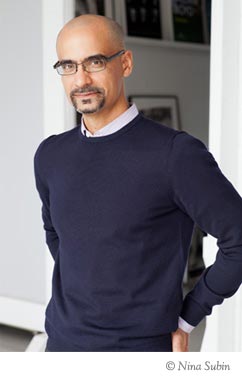 "Sadly, I grew up in something of a bookstore desert. When you grow up poor and marginalized spatially, that is often the case. There weren't bookstores of any kind anywhere near our neighborhood. I had to ride a bus over an hour to reach a Waldenbooks (back when there were Waldenbooks). It wasn't until I was older and had a car that things changed. I found the Montclair Book Center, among other places, a bookstore I still visit regularly.
"Sadly, I grew up in something of a bookstore desert. When you grow up poor and marginalized spatially, that is often the case. There weren't bookstores of any kind anywhere near our neighborhood. I had to ride a bus over an hour to reach a Waldenbooks (back when there were Waldenbooks). It wasn't until I was older and had a car that things changed. I found the Montclair Book Center, among other places, a bookstore I still visit regularly.
"But to speak strictly as a writer, I wouldn't be where I am if not for independent bookstores. My first book, Drown, stayed alive, and in turn kept my career alive, because independent booksellers continued to put the book in people's hands long after everyone else had forgotten it. For 11 years, I had no other book and yet indie booksellers kept their faith in me. To them, I owe very much. I'll definitely be in a lot of indie bookstores on this tour, as many as will have me."
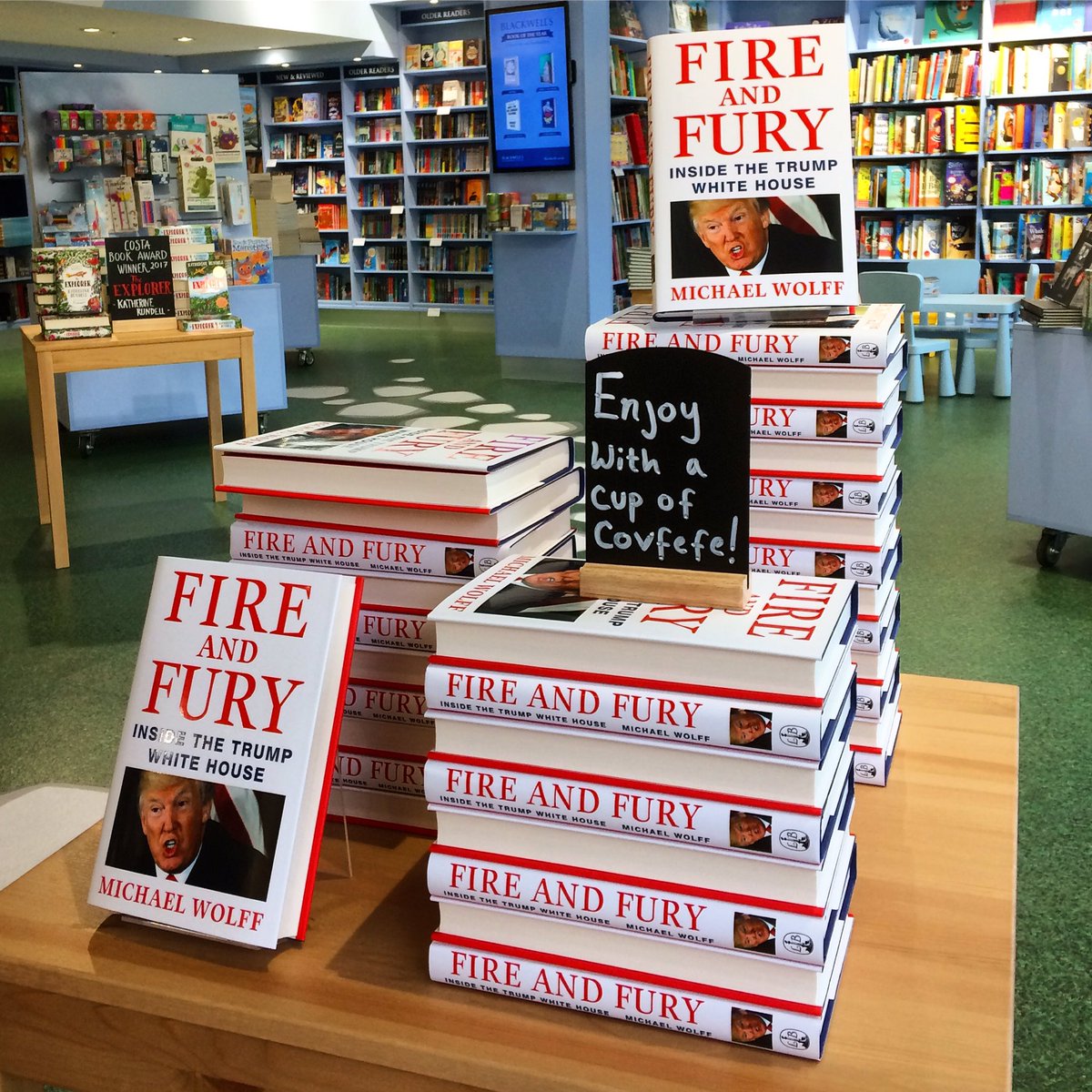 |
|
| On display at Blackwell's, Oxford, England | |
Holt has shipped more than 700,000 hardcover copies of Fire and Fury: Inside the Trump White House by Michael Wolff and is in its 11th printing, for a total of 1.4 million copies, the company said yesterday. On sale just a week, the expose of the Trump White House has set a record for Holt with its "historic rate of sales velocity driven by consumer demand for books across all formats, including physical hardcovers, e-books and audiobooks."
The book is the No. 1 title on the New York Times nonfiction bestseller list dated January 21, based on only two days of sales after its January 5 pub date. It will also be the No. 1 title on the combined print and e-book list.
"We have worked with our suppliers and customers to ensure everybody has books as fast as humanly possible, and expect all accounts to have additional stock within the next few days," Don Weisberg, president of Macmillan Publishers, said. "This could not have happened without the help of the entire community involved in the print and distribution process that we rely on to replenish stock, including the printers, paper manufacturers, our warehouse, truckers, booksellers and our sales force. It has been a thrilling experience to be a part of this."
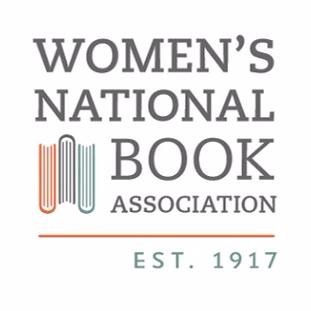 Nominations are now open for the WNBA Pannell Award, which is co-sponsored by the Women's National Book Association and Penguin Young Readers Group. The award recognizes bookstores that "enhance their communities by bringing exceptional creativity to foster a love of reading and books in children and young adults." One Pannell Award is given to a general bookstore and one to a children's specialty bookstore.
Nominations are now open for the WNBA Pannell Award, which is co-sponsored by the Women's National Book Association and Penguin Young Readers Group. The award recognizes bookstores that "enhance their communities by bringing exceptional creativity to foster a love of reading and books in children and young adults." One Pannell Award is given to a general bookstore and one to a children's specialty bookstore.
Nominations can be made by customers, sales reps, store personnel or anyone else either by completing the online nomination form or by sending an e-mail to WNBAPannell@gmail.com. Nominations need to include the name, e-mail address and phone number of the person making the nomination; that person's connection to the nominated store (such as customer, owner, employee, publisher); bookstore name, address and contact information for the bookstore owner/manager; and a brief statement outlining the reasons for nominating the bookstore.
Nominations must be made by February 3. Each winner receives a $1,000 check and a framed, signed original piece of art by a children's illustrator during a presentation at BookExpo's Children's Book and Author Breakfast this May in New York City.
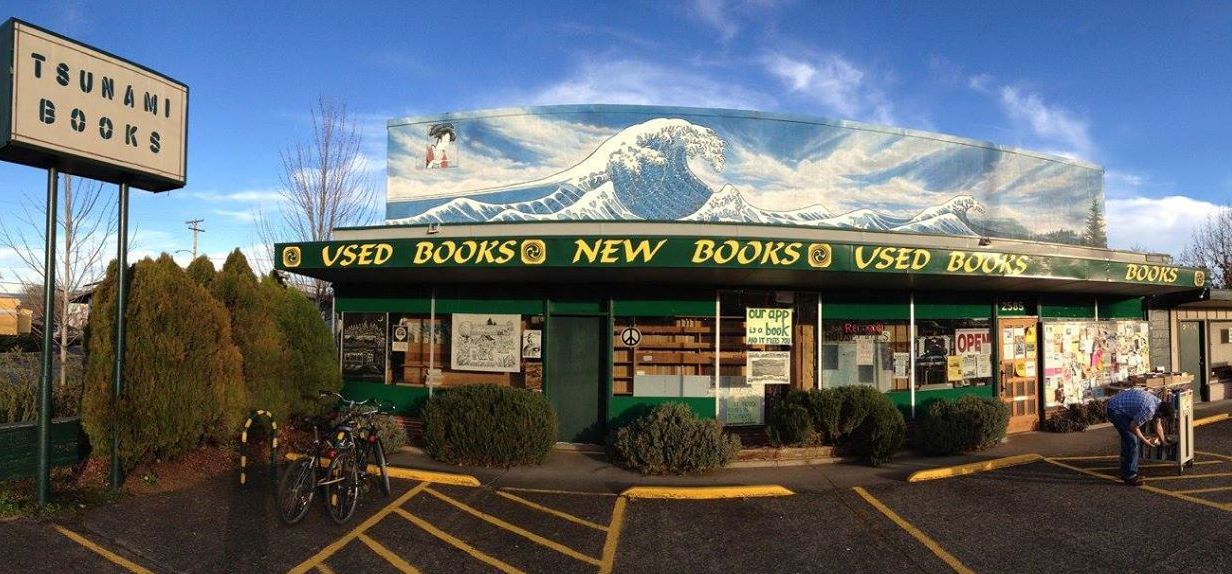 Tsunami Books, a 22-year-old independent bookstore in Eugene, Ore., is rallying customers and community members to help come up with $302,000 by January 15 in order to sign a new long-term lease and stave off closure, Oregon's KEZI reported. As of Wednesday evening, store owner Scott Landfield has managed to raise some $189,000 through donations, gifts and loans.
Tsunami Books, a 22-year-old independent bookstore in Eugene, Ore., is rallying customers and community members to help come up with $302,000 by January 15 in order to sign a new long-term lease and stave off closure, Oregon's KEZI reported. As of Wednesday evening, store owner Scott Landfield has managed to raise some $189,000 through donations, gifts and loans.
In a message posted to the store's Facebook page on January 1, Landfield explained that in order to secure a new 10-year lease, the store needs to have $302,000 in an escrow account by January 15. As of January 1, he had already raised $141,000; since then, gifts, pledges and bridge loans have lifted the total to around $189,000, leaving another $115,000 to go. Landfield noted that while the new lease will more than double the store's monthly rent, he cannot afford to move to another location in Eugene.
Landfield also described outpourings of support on Facebook: over the weekend, "literally hundreds of people contributed to the Escrow Rent Fund" during two standing-room-only events, and on Tuesday an "ad hoc Committee meeting to Help Secure the Future of Tsunami Books filled two long tables in the back room." He added that 550 pledges have been fulfilled and several community events are planned for this coming weekend that he expects to bring in around 100 people each.
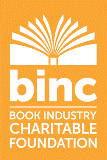 The Book Industry Charitable Foundation will accept applications for its annual Higher Education Scholarship Program from January 14 until March 5. Up to $109,000 in scholarships will be awarded to eligible bookstore employees/owners, independent bookseller association employees, former Borders Group employees, and dependents of any of the above. Detailed eligibility requirements, selection criteria and information on how to apply are available here.
The Book Industry Charitable Foundation will accept applications for its annual Higher Education Scholarship Program from January 14 until March 5. Up to $109,000 in scholarships will be awarded to eligible bookstore employees/owners, independent bookseller association employees, former Borders Group employees, and dependents of any of the above. Detailed eligibility requirements, selection criteria and information on how to apply are available here.
The scholarships include 24 for $3,500 each, two for $10,000 each and one $5,000 Karl Pohrt Tribute Scholarship award, granted to an independent bookstore candidate "who has overcome learning adversity or is a non-traditional student." Since 2001, Binc's Higher Education Scholarship Program has awarded $1.9 million to more than 675 recipients.
"The Binc Higher Education Scholarship is just one of the ways we seek to create opportunities for booksellers to pursue their dreams,” said executive director Pam French. "Helping to reduce the financial burden of college or trade school tuition for booksellers and their families is one way Binc can help fulfill our mission to strengthen the entire bookselling community."
This year, the minimum number of days a person must work in a bricks-and-mortar bookstore has been decreased. All current employees/owners and dependents of retail bookstores in the U.S. who have a minimum of 90 days of continuous employment are eligible. The bookstore must have a retail bricks-and-mortar presence in the U.S. and generate a substantial portion of its revenue from the sale of books. Eligible employees must be employed directly by the bookstore.
"In order to help as many booksellers as possible achieve their education goals, the decision was made to reduce the employment period to 90 days from the previous requirement of one year," French added.
Louis Collins, a longtime Seattle used bookseller and co-founder of the Seattle Antiquarian Book Fair, died January 2. In the Seattle Review of Books, Paul Constant wrote: "Collins got his start as a bookseller in San Francisco, using his remarkable memory as a resource for customers who were in the market for specific rare titles. He worked as a bookseller for nearly a half century, right up until the day he died. For many decades, he sold books under the Louis Collins Books shingle out of a little blue house at 12th and Denny on Capitol Hill. He finally sold the property last year and moved to the north end of the city.... He deeply enjoyed working as a bookseller, but the Seattle Antiquarian Book Fair was a true labor of love.... It was here in Seattle, among our readers and our collectors and our lovers of books, that he felt most at home. We will miss him greatly."
"He had books no one else had, and sold books no one else could," Jamie Lutton, owner of Twice Sold Tales, told the Stranger, adding: "I was nervously fond of him and admired him greatly. This is a huge loss for the community."
David Gregor of Gregor Rare Books, who had known Collins for decades and had run the fair alongside him for 13 years, said he was "one of the last of the old guards in Seattle. Not many left."
.jpg) |
|
| Lissa Muscatine and Bradley Graham | |
Lissa Muscatine and Bradley Graham, co-owners of Politics and Prose Bookstore, Washington, D.C., are among those honored as "Washingtonians of the Year" in the latest issue of Washingtonian magazine, which noted that "with record-high sales six years in a row, Politics and Prose not only remains a cherished fixture for book lovers--with a recent expansion to the Wharf and plans to open in the Union Market district in 2018--but also has become a haven for the local community after the 2016 election."
"It's been a really emotional year in some ways, because our customers have been reaching out for solace and guidance," said Graham.
Washingtonian noted that in response, Muscatine and Graham have "added 'teach-ins' to their schedule of events--forums where people can discuss nonpartisan topics such as women's rights and civil liberties."
This resulted in an "incredibly fruitful year for both the bookstore and the community," Muscatine noted. "The election and its aftermath--and certainly the reaction of the people who support this store--reinforced why independent bookstores matter."
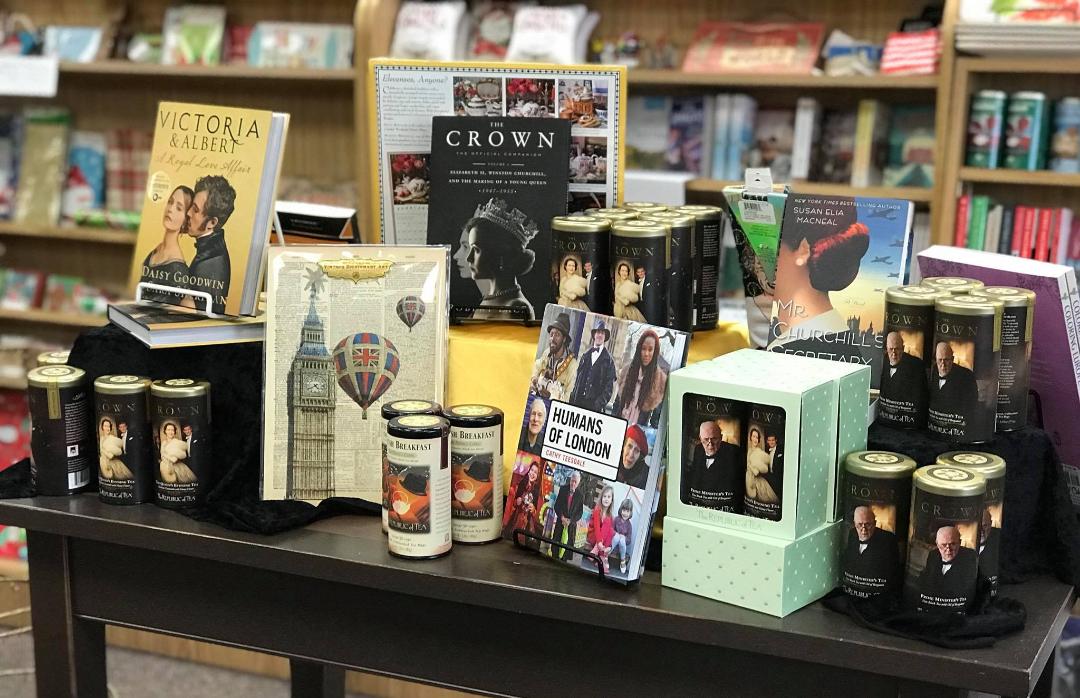 To celebrate National Tea Month, the gift buyer at Anderson's Bookshop, Naperville, Ill., has created a floor display featuring a special selection of teas, along with books and gift products to complement them. This week, the store is featuring teas inspired by the award-winning Netflix series The Crown, with the display built around this theme.
To celebrate National Tea Month, the gift buyer at Anderson's Bookshop, Naperville, Ill., has created a floor display featuring a special selection of teas, along with books and gift products to complement them. This week, the store is featuring teas inspired by the award-winning Netflix series The Crown, with the display built around this theme.
At Vintage/Anchor:
Angie Venezia is now an assistant director of publicity. She was previously publicity manager.
Jessica Deitcher is now a marketing manager. She was previously associate marketing manager.
Laura Chamberlain is now a marketing manager. She was previously associate manager, backlist.
---
At Sourcebooks, Valerie Pierce is being promoted to senior marketing manager.
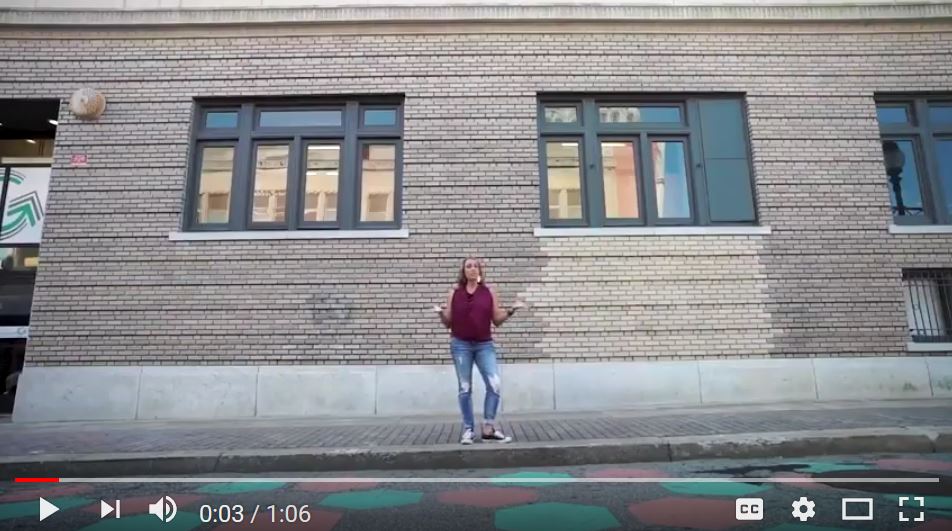
Monday:
The Talk: Derrick Levasseur, author of The Undercover Edge: Find Your Hidden Strengths, Learn to Adapt, and Build the Confidence to Win Life's Game (Sourcebooks, $25.99, 9781492650591).
A trailer has been released for Red Sparrow, the movie adaptation of Jason Matthews's spy novel, Deadline reported. Jennifer Lawrence stars as a ballerina-turned-secret weapon in the project, directed by Francis Lawrence from Justin Haythe's script. The "loaded cast" includes Joel Edgerton, Matthias Schoenaerts, Charlotte Rampling, Mary-Louise Parker and Jeremy Irons. Red Sparrow hits theaters March 2.
Bao Phi, author of A Different Pond (illustrated by Thi Bui, Capstone Young Readers), won the 2018 Charlotte Zolotow Award, given annually to the author of the best picture book text published in the U.S. during the preceding year. The award is sponsored by the Cooperative Children's Book Center, a library of the School of Education at the University of Wisconsin-Madison.
The committee also named five Honor Books: Baby Goes to Market by Atinuke, illustrated by Angela Brooksbank (Candlewick); Buster and the Baby by Amy Hest, illustrated by Polly Dunbar (Candlewick ); Herbert's First Halloween by Cynthia Rylant, illustrated by Steven Henry (Chronicle); Jabari Jumps by Gaia Cornwall (Candlewick); and Niko Draws a Feeling by Bob Raczka, illustrated by Simone Shin (Carolrhoda Books).
---
Finalists have been announced in multiple categories for the Edward Stanford Travel Writing Awards, which "celebrate the best travel writing and travel writers in the world." The winner of the Stanford Dolman Travel Book of the Year (in partnership with the Authors' Club) gets £5,000 (about $6,770), and all winners receive an antique globe trophy, to be presented at the awards ceremony February 1. A complete list of finalists is available here.
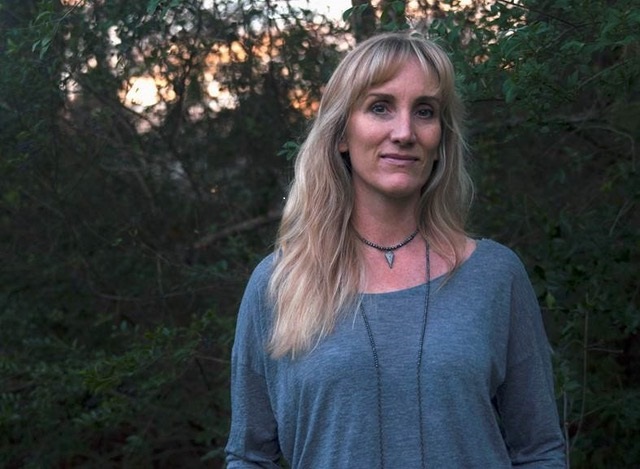 |
|
| photo: McKenna Quatro | |
Jamie Quatro's first novel, Fire Sermon (Grove Press, January 9, 2018), is a January 2018 Indie Next Selection. Her first short story collection, I Want to Show You More, was published in 2013. Quatro is a contributing editor at Oxford American and teaches in the MFA program at Sewanee, the University of the South. She lives with her husband and four children in Lookout Mountain, Ga.
On your nightstand now:
It's a mighty big stack. Let's see: a galley of Leslie Jamison's The Recovering, out in April--it's a blend of memoir, reportage, literary criticism and cultural history that overturns and re-visions the addiction memoir. Karen Tei Yamashita's I Hotel, a National Book Award finalist, which I'm reading in preparation for a panel we're on together at AWP. Nafissa Thompson-Spires's forthcoming story collection, Heads of the Colored People, which dissects racism with a forensic scrutiny I've never seen before. Jesmyn Ward's Sing, Unburied, Sing, excerpts of which I read in the Oxford American and immediately bought the book. The new James Salter essay collection, Don't Save Anything, because new James Salter! Stephen Prothero's brilliant God Is Not One and the Qur'an, both of which I'm reading to prepare for a lecture next April.
Favorite book when you were a child:
Madeleine L'Engle's Time Quintet series. My favorite book was A Wind in the Door, though the images of evil terrified me: I used to scan the night sky for rips in the galaxy and wonder if my elementary school principal was himself or a replica (and would I be able to tell the difference?). When I felt tired, I'd wonder if an Echthroi was attacking my mitochondria or farandolae. I think what I was drawn to, as a child, was the notion of instantaneous connections between things at the cosmic and cellular levels. That kind of unity felt, and still feels, deeply true to me.
Your top five authors:
This is an impossible question. Can I make it into two categories, "older" and "newer"? 1) Austen, Dickens, Woolf, Faulkner, Joyce. 2) Grace Paley, Barry Hannah, James Salter, Sharon Olds, Maggie Nelson.
Book you've faked reading:
Anna Karenina. How embarrassing to admit. I skipped all the Levin/farming business to get to Anna and Vronsky.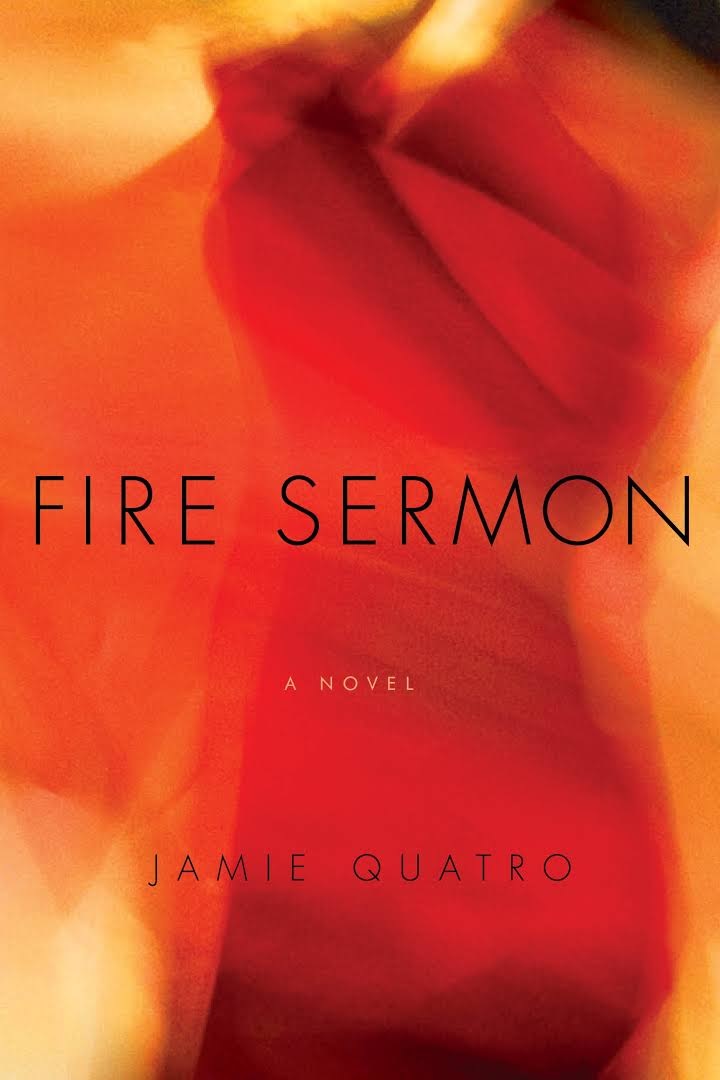 Book you're an evangelist for:
Book you're an evangelist for:
Poetry. All of it. Jack Gilbert is the poet I find myself most often re-reading; he's not afraid to use the big feeling words, love and failure and grief and loneliness. Like Sharon Olds, he doesn't shy away from writing about the messiness of sexual love. It's an exciting time to be a poetry lover; there are so many talented artists working today. Some of my favorites are: T.J. Jarrett, Rebecca Gayle Howell, Kaveh Akbar, Emilia Phillips, Tomás Q. Morín, Donika Kelly, Tiana Clark, Nickole Brown, Ansel Elkins, Victoria Chang, Terrance Hayes, Nikky Finney, Natalie Diaz and Kevin Young. When students ask, "How do I become a writer?" the first thing I say is read poetry. I've thought about getting it tattooed on my palm.
Book you've bought for the cover:
My daughter collects editions of The Great Gatsby. I recently bought her a "Benediction Classics" edition. I'd never heard of the press (out of Oxford) or seen the cover illustration--a red-haired woman in vampish '20s attire, striking a devil-may-care pose with a smoking cigarette in a theater-length holder balanced on her upturned palm.
Book you hid from your parents:
More embarrassment: Forever and Wifey by Judy Blume. Actually, I didn't hide Wifey. It was a level up from Forever, sex-wise, so I coerced my best friend into hiding it for me. Forever was risky enough--I was a sheltered kid.
Book that changed your life:
Joyce's A Portrait of the Artist as a Young Man is the book that made me want to be a writer, when I was in college. The way he probed the sexual/sacred connection, and the way he could turn words into music. More recently, Christian Wiman's My Bright Abyss. I've probably read it 10 times.
Favorite line from a book:
"That world! These days it's all been erased and they've rolled it up like a scroll and put it away somewhere. Yes, I can touch it with my fingers. But where is it?" --from Denis Johnson's short story "Emergency," in Jesus' Son.
Five books you'll never part with:
Salter's Light Years. Woolf's To the Lighthouse. C.S. Lewis's Collected Letters. My mother's copy of Jane Eyre. And a falling-apart Bible my parents gave me when I graduated from high school.
Book you most want to read again for the first time:
David Foster Wallace's "Good Old Neon," in his collection Oblivion. It's a long short story. I would say why, but that would give too much away. That story was--and still is--a revelation.
Up-and-coming writers you're excited about:
Sidik Fofana, a New York-based writer whose first two stories were published by Adam Ross in the Sewanee Review. Sidik and I read at an event together, and he is one of the best readers I've ever heard. Danielle Lazarin, whose collection Back Talk comes out in February. A writer based in Belfast, Phil Harrison, whose debut novel, The First Day, was just released in the U.S. And Jamey Hatley, a Memphis writer whose work I've read in the Oxford American. She's one to watch.
Next Year in Havana by Chanel Cleeton (Berkley, $15 paperback, 400p., 9780399586682, February 6, 2018)
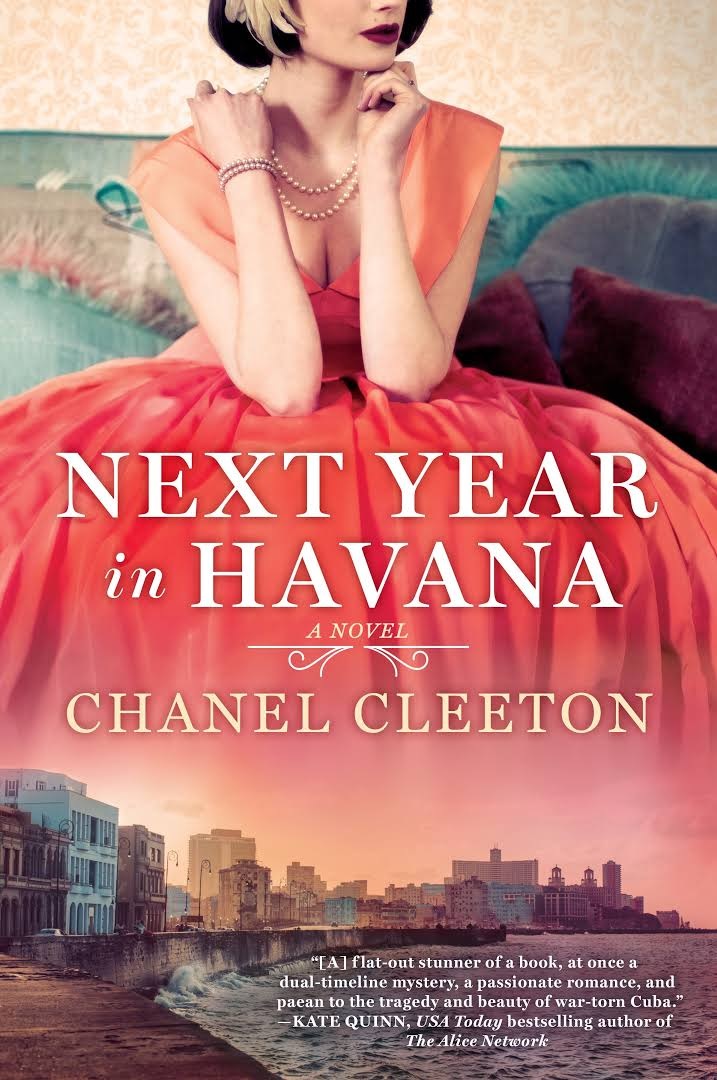 Cuban American writer Marisol Ferrera grew up on her grandmother's stories: richly described tales of the Perez family's privileged life in Havana before the revolution. The daughter of a sugar baron, Elisa Perez was forced to flee with her family when Fidel Castro and his men ousted Batista in 1959. Marisol loves her life in Miami, but has always dreamed of visiting her family's homeland. When Elisa dies, she leaves Marisol a letter and a final request: that her granddaughter travel to Havana and spread her ashes in the city she loved. "You'll know where," she assures Marisol. Chanel Cleeton (Wild Aces series) weaves the stories of these two strong women in a lush, compelling historical novel, Next Year in Havana.
Cuban American writer Marisol Ferrera grew up on her grandmother's stories: richly described tales of the Perez family's privileged life in Havana before the revolution. The daughter of a sugar baron, Elisa Perez was forced to flee with her family when Fidel Castro and his men ousted Batista in 1959. Marisol loves her life in Miami, but has always dreamed of visiting her family's homeland. When Elisa dies, she leaves Marisol a letter and a final request: that her granddaughter travel to Havana and spread her ashes in the city she loved. "You'll know where," she assures Marisol. Chanel Cleeton (Wild Aces series) weaves the stories of these two strong women in a lush, compelling historical novel, Next Year in Havana.
Protected and privileged, Elisa and her sisters are dimly aware of the rumblings of revolution in their city, though their brother has been caught up in the fervor. When Elisa meets Pablo, a young lawyer and compatriot of Fidel, she finds herself torn between the family she loves and the man she can't stop thinking about. Pablo's passion for change makes Elisa question her comfortable existence, but she is hampered by her family loyalty and her own fears. Half a century later, Marisol is drawn to Luis, the grandson of Elisa's best friend, for similar reasons. A history professor who writes anonymously online, Luis gives voice to his fierce love of his country and equally fierce hatred of the Cuban government. But his writings may have consequences for his family, and Marisol wonders if she can truly understand a man who shares her nationality but almost nothing of her life experience.
Cleeton moves back and forth between her protagonists' narratives, evoking the glamour and danger of 1950s Cuba in Elisa's stolen moments with Pablo: sunset walks along the Malecón, furtive meals in neighborhoods Elisa has never seen before. In present-day Havana, Marisol soaks in the charm of her ancestral city while struggling to reconcile a number of contradictions. "Havana lends itself to the romantic and the idyllic even as the evidence to the contrary is everywhere I look," she muses. "There's a violence to our history that gets lost somewhere in the telling, buried beneath the beautiful scenery." Both the violence and the beauty are part of her family's story, and Marisol must adjust her understanding of her grandmother and her own identity as more secrets come to light. Cleeton's novel explores the tangled reality of being Cuban: persistent despair, stubborn hope and flashes of defiant joy, as well as a deeply rooted love for a complicated home. --Katie Noah Gibson, blogger at Cakes, Tea and Dreams
Shelf Talker: Chanel Cleeton's lush, compelling historical novel weaves together two stories of love, revolution and family secrets in Cuba.
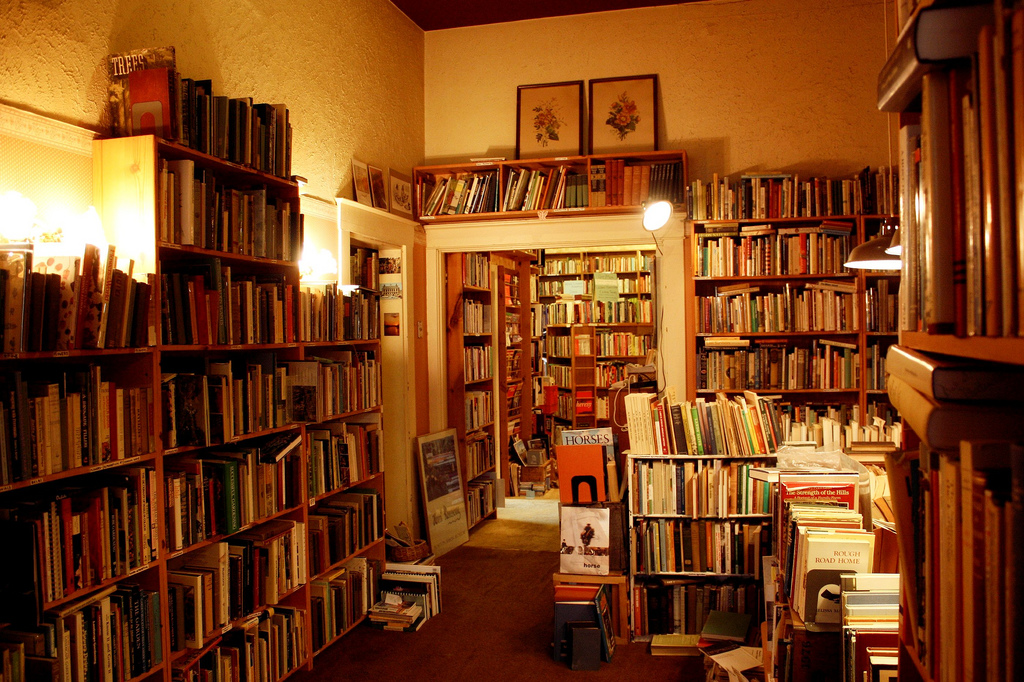 |
|
| via | |
We are a people of words; it's our best side. No surprise, then, that I have become intoxicated by my discovery of a new word, a mere toddler in fact at just a few years old. Vellichor has nestled in my bookish mind this week and, I suspect, will never leave again. That's how words live, since--by definition you might say--they are parasites.
John Koenig, curator of The Dictionary of Obscure Sorrows, a compendium of invented words, defines vellichor this way: "n. the strange wistfulness of used bookstores, which are somehow infused with the passage of time--filled with thousands of old books you'll never have time to read, each of which is itself locked in its own era, bound and dated and papered over like an old room the author abandoned years ago, a hidden annex littered with thoughts left just as they were on the day they were captured." (Here's another exploration of the word)
I wouldn't want to live in a world without vellichor.
In a TED Talk, Koenig noted that people often ask him if his words are real. "What I discovered is that when people are asking if a word is real, they're really asking, well, how many brains will this give me access to?" he said. "Because I think that's a lot of how we look at language. A word is essentially a key that gets us into certain people's heads.... A real word is one that gets you access to as many brains as you can. That's what makes it worth knowing.... The meaning is not in the words themselves. We're the ones that pour meaning into it.... We forget that words are made up. It's not just my words. All words are made up, but not all of them mean something."
 Vellichor has subtly found its way into the lexicon, thanks in part to the Twitter hashtag #vellichor, but also through common usage. Examples are not hard to find. In a profile of a Northampton bookshop, MassLive.com observed: "Walking around the Old Bookstore on Masonic Street, vellichor fills the heart and mind." I saw it dropped casually into a piece on Lippincott Books in Hampden, Maine; and another about the Canadian bookseller Allison the Bookman in North Bay, Ontario; and in the headline "Time to take the vellichor to the second floor, and beyond," showcasing Egyptian bookshop Bibliotheca Alexandrina.
Vellichor has subtly found its way into the lexicon, thanks in part to the Twitter hashtag #vellichor, but also through common usage. Examples are not hard to find. In a profile of a Northampton bookshop, MassLive.com observed: "Walking around the Old Bookstore on Masonic Street, vellichor fills the heart and mind." I saw it dropped casually into a piece on Lippincott Books in Hampden, Maine; and another about the Canadian bookseller Allison the Bookman in North Bay, Ontario; and in the headline "Time to take the vellichor to the second floor, and beyond," showcasing Egyptian bookshop Bibliotheca Alexandrina.
Last year, The Better India explored the "organized chaos" of the Ravivari, a bazaar on the east bank of the Sabarmati River in Ahmedabad: "The area of booksellers comes after a series of stalls selling antiques, paints, and domestic goods. After weaving through narrow passages shaded by parasols, littered with the smell of nimbu-paani, daal-haleem, and sometimes assorted animal dung, one arrives at the booksellers. Instant vellichor!"
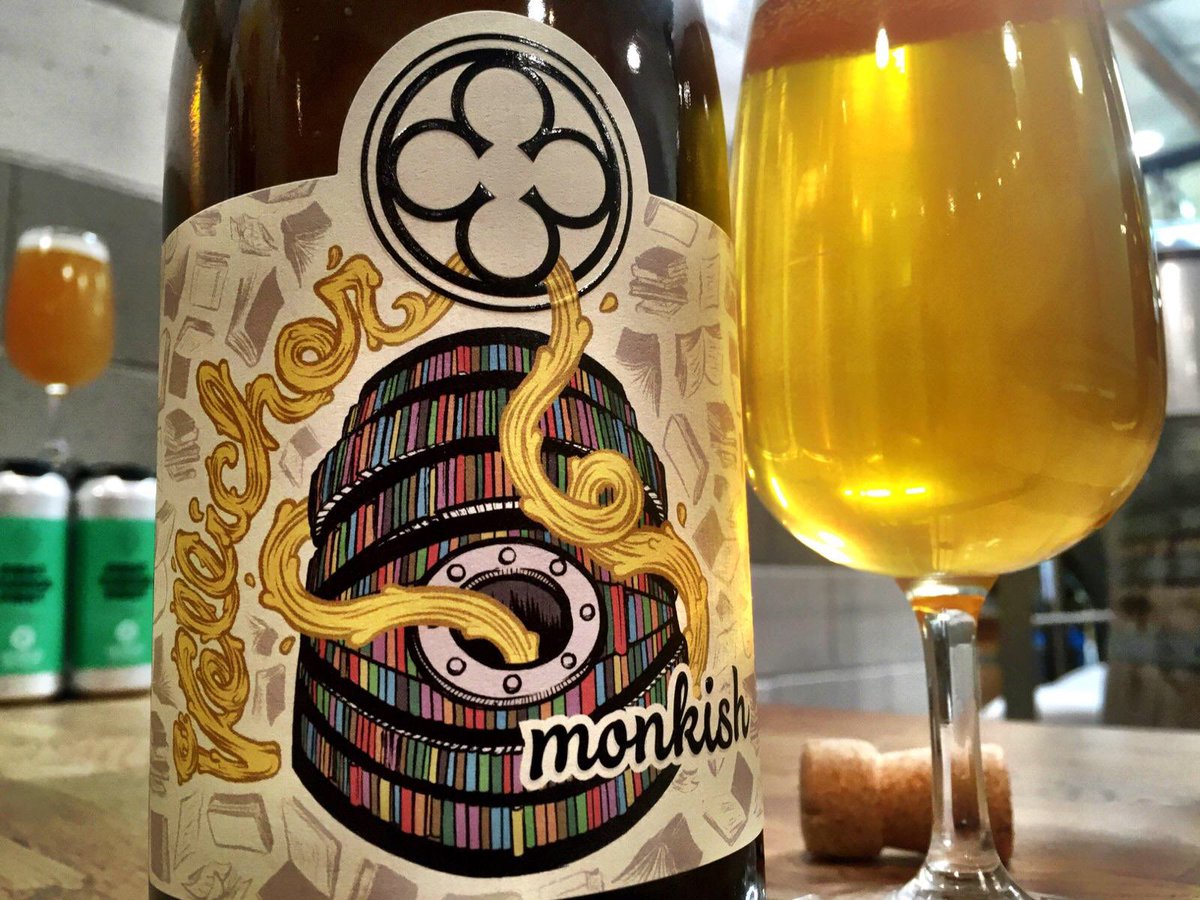 I've even found the word attached to Vellichor Wines ("we believe, like each book, each bottle has a unique story"), Monkish Brewing Co.'s Vellichor craft beer, and an Oslo-based band.
I've even found the word attached to Vellichor Wines ("we believe, like each book, each bottle has a unique story"), Monkish Brewing Co.'s Vellichor craft beer, and an Oslo-based band.
So, vellichor has been my mood this week, even though I'm not someone who spends a lot of time in used bookshops, primarily because my allergies won't tolerate the otherwise irresistible essence derived from "the chemical breakdown of compounds within paper that leads to the production of 'old book smell.' "
There was one notable exception to this, however. From 1973 until 1997, I lived in Rutland, Vt., and often haunted Tuttle Antiquarian Books. It wasn't a particularly welcoming place. I thrived on its laissez-faire attitude toward customer service because I preferred being left alone to explore room upon musty room of book-laden shelves. And I will be forever in their debt because I first discovered the wonders of Asian literature and art there.
Charles Tuttle, who died in 1993, was serving as an American soldier in Tokyo after World War II when he fell in love with Japanese culture. He made it his life's mission to introduce this world to American readers. In addition to its extensive used book inventory, Tuttle Antiquarian Books displayed and sold an array of new titles from Tuttle Publishing.
One of many books I bought there was Zen Art for Meditation by Stewart Holmes and Chimyo Horioka (1973). As I write these words, that old book is on a shelf not far from my desk. Opening it to page 25, I see a reproduction of "Bare Willows and Distant Mountains." On the facing page, the commentary begins, "How remote from the everyday world this landscape seems!"
I felt the same way about Tuttle Antiquarian Books. In those isolated rooms, I also discovered an even more remote, yet somehow immediate and tangible, place to live through the books I found there. Many years ago, I met Mr. Tuttle on a golf course and thanked him personally for the new world he had given me. I'm still grateful, if strangely wistful. Call it vellichor if you like.